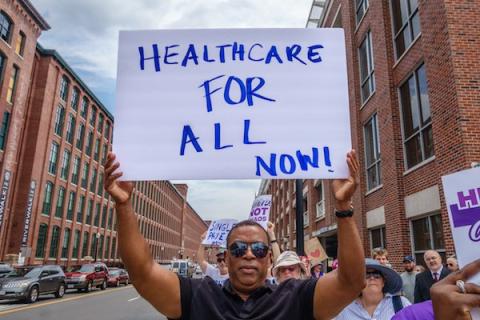Health care has been a dilemma in the U.S. for decades now. There’s been a lot of discussion about what the best way to fix our “broken” system is, but time and again, the government fails to take action. Could it be that the answer is staring us straight in the face?
Obamacare, or the Affordable Care Act to use its formal name, was at first proposed with many of the features that you find in health care systems from nations like Canada and Germany. These are socialized systems that manage to provide competent care for all of the nation’s people.
However, a major difference in these systems and the way we do health care in the United States is the use of a single payer. That one provision could change everything.
Single What?
In Canada, for example, there are no deductibles on basic care, and co-pays are kept very low. Nearly no money is spent on advertising. The result is that the overall impact of getting medical attention on society is cheaper.
Not only that, but more people get the attention they need — leading to a healthier community with fewer medical costs overall. Compared to the U.S. where health care costs 17 percent of our GDP, Canada’s medical costs are 11 percent.
The way that countries like Canada go about providing socialized care for all is by paying for it with tax dollars. That’s about all you have to know to understand the opposition to a single-payer system from conservatives — according to them, socialized medicine leads to a tax hike, which leads to the end of life as we know it.
Except what’s the point of avoiding a tax hike if not to save money? Allowing a tax increase that funds services that reduce the nation’s overall costs would be a good thing from a fiscal standpoint, right? So does single-payer cost more, or does it save money?
Does It Really Work?
In nations that use single payer-systems, health care savings of up to 50 percent have been realized. That’s no drop in the bucket. The savings come in the overall cost of services.
With a single payer, there’s no competition between insurers. The government pays for all health care at the agreed-on rate. Procedures cost the same, regardless of your plan or tax bracket.
There are a few exceptions to that. The very wealthy would pay about 5% more than the general population. However, costs would still be ultimately lower than they are in our free-market system.
You also have the option to seek an outside specialist for voluntary procedures such as cosmetic surgery —things that aren’t required for one to be healthy. In the overwhelming majority of cases, it’s a better system than our current one.
How Soon Can I See the Doctor?
One of the tactics opponents have used to spread fear about a single-payer system is that in such a system, you might die waiting for an important operation or diagnostic.
The fact is, these long waits come only for non-urgent procedures. Yes, you have to trust the government to make a judgment call about what constitutes urgent vs. non-urgent.e reason for that, though, is to ensure severe conditions get attention right away — not just those who can afford to pay for a spot at the front of the line.
Currently, we have a system where millions of people who need attention flat-out cannot get it. Is that any better? In the words of House Speaker Paul Ryan “our goal is to give every American access to quality, affordable health care.” Could it be that the eventual shape of America’s health care system is a single-payer arrangement?
The Road Ahead
The idea has been proposed in the past.
In 2002, the “Medicare for All” proposal was suggested by US Rep. John Conyers. While the bill received mediocre support, it highlights the importance of being open-minded in the conversation about implementing single-payer. An American system doesn’t have to look like the systems other countries use.
No two nations that have a single-payer system subscribe to the same rules. In fact, that would be absurd to think. So why do we continue to fall victim to critiques of other nation’s health care systems when Americans would have something custom-made for them?
Conservatives will deny it, but they are protecting business in the form of big pharma and hospitals at the cost of better overall well-being for Americans. When the wealthy are willing to make a small sacrifice so that all of us can enjoy better health, we might be able to see single-payer pushed through.
Editor's Note: This article originally published on the author's blog, and has been modified slightly for publication on IVN.
Photo Credit: Heidi Besen / shutterstock.com
